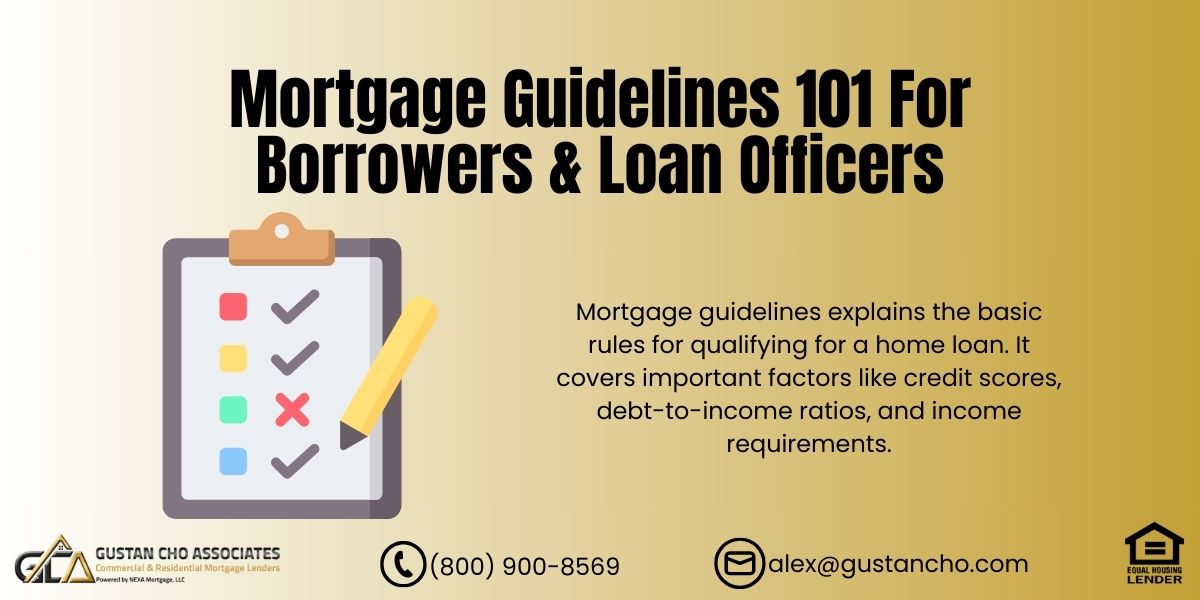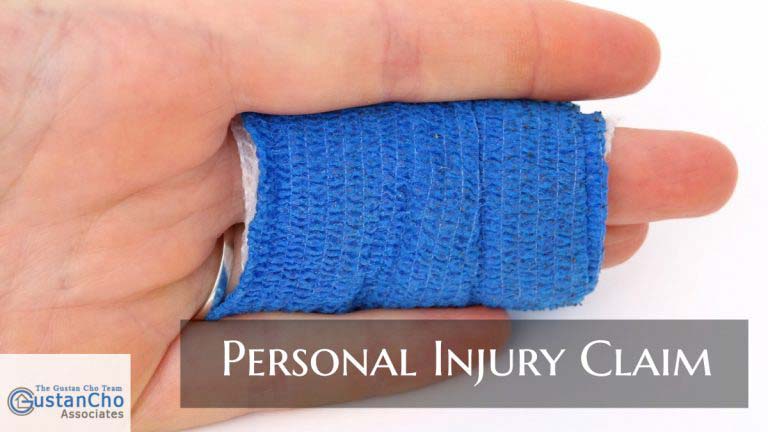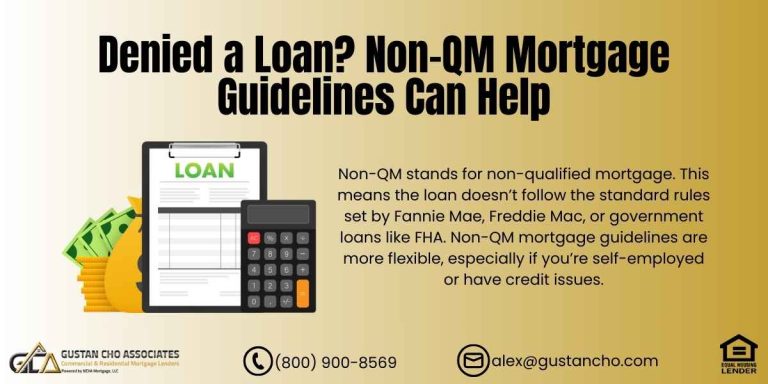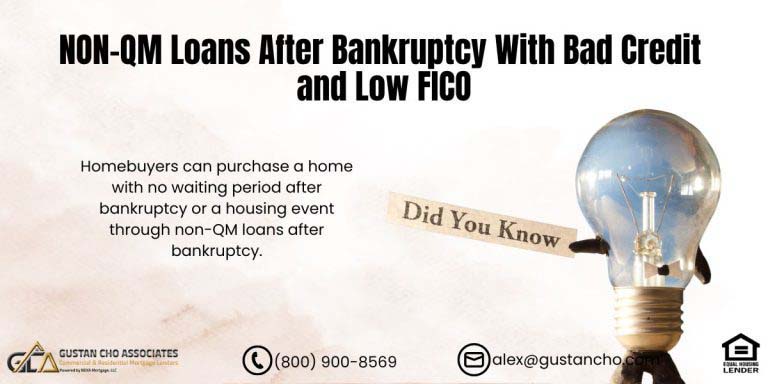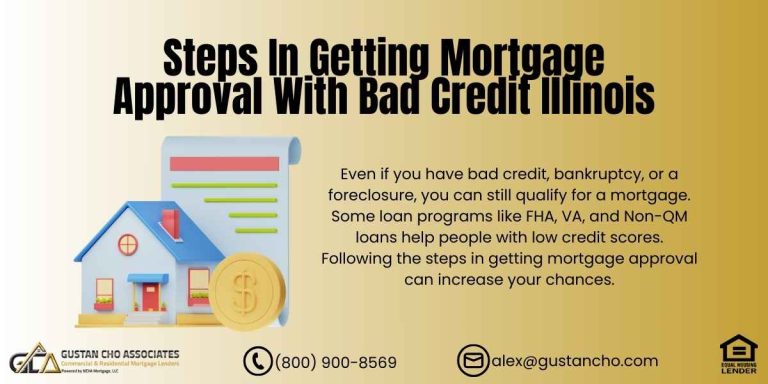Mortgage Guidelines 101: A Complete Guide for Borrowers and Loan Officers
Welcome to Mortgage Guidelines 101, the ultimate guide for borrowers and new loan officers! At Gustan Cho Associates, we understand that the mortgage process can feel overwhelming. Whether you’re a first-time homebuyer or a new loan officer eager to master the basics, this blog is designed to simplify mortgage guidelines and give you the confidence to achieve your goals. In the following paragraphs, we will cover mortgage guidelines 101.
Mortgage Guidelines 101: Why Borrowers Choose Gustan Cho Associates
Over 75% of our borrowers come to us after being denied by other lenders. Why? Many lenders issue pre-approvals without fully understanding mortgage guidelines or their own company’s lender overlays. At Gustan Cho Associates, we ensure every borrower is properly qualified so you can close your loan on time—often in 21 days or less!
Our lack of lender overlays on both government and conventional loans simplifies your qualification process. This means you can more easily meet the necessary criteria when applying for a mortgage.
Let’s dive into the key aspects of mortgage guidelines 101 and how we help borrowers and loan officers succeed.
Mortgage Guidelines 101: Understanding the Basics
Mortgage guidelines determine who qualifies for a home loan. These rules come from federal agencies like FHA, VA, USDA, Fannie Mae, or Freddie Mac for conventional loans. Lenders may also add their own requirements, called overlays, but at Gustan Cho Associates, we work with lenders who stick to the basics.
Start Your Process Towards Buying A Home
Apply Online And Get recommendations From Loan Experts
Here’s what you need to know:
Mortgage Guidelines 101: Key Mortgage Approval Factors
- Credit Score: Your middle credit score (the second-highest of your three scores) determines eligibility. For example:
- FHA Loans: Minimum 580 for a 3.5% down payment
- VA Loans: Minimum 580 (no overlays, no DTI caps)
- Conventional Loans: Minimum 620 (higher scores improve your rates)
- Debt-to-Income Ratio (DTI): Debt-to-Income Ratio (DTI) represents the portion of your income allocated towards debt repayment. Understanding DTI is crucial for assessing your financial health and ensuring you stay within manageable limits. Typically, lenders prefer a DTI that does not exceed certain thresholds, as this can affect your loan eligibility. Common DTI limits:
- FHA: Up to 46.9% front-end, 56.9% back-end for credit scores 620+
- VA: No specific DTI cap, but lower DTIs improve approval odds
- Conventional: Typically under 50%
- Income Verification: Proof of stable income is required. For non-traditional loans, borrowers can use W2s, tax returns, or even bank statements.
- Down Payment: Minimums vary:
- FHA: 3.5%
- VA: 0% (for eligible veterans and service members)
- Conventional: 3-20%, depending on credit and loan type
- Credit History: Recent late payments, collections, or disputes can impact eligibility. At Gustan Cho Associates, we help borrowers with challenging credit rebuild their profiles to qualify.
Why Loans Get Denied Elsewhere
Most loan denials happen because lenders fail to:
- Understand mortgage guidelines
- Account for lender overlays
For example, a borrower might meet FHA’s 580 credit score requirement, but a lender with overlays might demand a higher score. At Gustan Cho Associates, we strictly follow agency guidelines, making it easier for you to qualify.
Common Issues:
- High DTIs: Some lenders cap DTIs below agency limits.
- Credit Disputes: Active disputes on non-medical collections over $1,000 can halt your application.
- Unverified Income: Lack of documentation can lead to delays or denials.
How to Become a Loan Officer
For aspiring loan officers, here’s a quick rundown:
- Get Your NMLS Number:
- Register at the NMLS Resource Center.
- This unique identifier stays with you throughout your career.
- Complete Pre-Licensing Education:
- Take a 20-hour NMLS-approved course.
- Pass the NMLS Exam:
- You’ll need a 75% score to pass the NMLS exam.
- Prepare by practicing 3,000+ test questions.
- State Licensing:
- Each state has its requirements.
- You’ll need federal and state background checks, a credit check, and sponsorship from a licensed company.
- Join a Company:
- At Gustan Cho Associates, we train new loan officers to excel in mortgage origination.
Updated FHA Guidelines for 2025
FHA loans are popular for their flexible requirements. Here’s what’s new:
- DTI Updates: Borrowers with scores below 620 must stay under 43% DTI.
- Collections and Charge-Offs:
- Medical collections are excluded from DTI calculations.
- Non-medical collections over $2,000: FHA requires lenders to factor in 5% of the balance as a hypothetical monthly expense unless a payment plan is established.
- Manual Underwriting:
- Required for borrowers in Chapter 13 bankruptcy repayment or with recent extenuating circumstances. Verification of Rent (VOR) is crucial for approval. Verification Of Rent is one of the most important compensating factors a borrower can have.
Example:
If you owe $10,000 in non-medical collections, FHA guidelines add $500 to your monthly DTI unless you arrange a payment plan.
Get In Touch For Qualify After Bankruptcy or Forecclosure
Apply Online And Get recommendations From Loan Experts
Qualifying After Bankruptcy or Foreclosure
Borrowers can qualify for FHA loans even after financial hardships. Here’s how:
- Chapter 7 Bankruptcy:
- Waiting period: 2 years from discharge.
- Chapter 13 Bankruptcy:
- Eligible after 12 months of on-time payments.
- Requires trustee approval and manual underwriting.
- Foreclosure or Short Sale:
- Waiting period: 3 years from the recorded date.
Late payments after these events can be a red flag. Borrowers should demonstrate 12 months of on-time payments before applying.
Verification of Rent: A Key Compensating Factor
If your credit score is under 620, the Automated Underwriting System (AUS) may require VOR. Here’s how it works:
- Private Landlord: Provide 12 months of canceled checks or bank statements showing rent payments.
- Property Management Company: A signed VOR form is sufficient.
- Rent-Free Living: Submit a letter from the family member or friend providing housing.
Credit Guidelines for FHA Loans
You don’t need perfect credit to qualify for an FHA loan. Here are key points:
- Collections: When it comes to collections, you generally do not need to pay them off immediately. However, it is important to note that having large balances can impact your debt-to-income (DTI) ratio. Hence, managing these balances wisely can make a significant difference in your financial profile.
- Credit Disputes:
- Medical collections: Allowed.
- Non-medical collections over $1,000: Disputes must be resolved before proceeding.
- Rebuilding Credit:
- Focus on on-time payments and adding positive trade lines like secured credit cards.
Gaps in Employment
Employment gaps don’t automatically disqualify you from getting a mortgage. Here’s what you need to know:
- Less than 6 months:
- Submit verification of your new employment and the first 30 days of pay stubs. This documentation is important as it helps confirm your income and employment status.
- 6 months or more:
- You must work in your new job for at least 6 months before applying.
Income Qualification Rules
Income stability is a must for mortgage approval. Here are some common scenarios:
- Part-Time or Bonus Income:
- Must have a 2-year history of consistent earnings.
- Self-Employment:
- Provide 2 years of tax returns.
- Changing from 1099 to W2:
- Qualify immediately with an offer letter, but provide 30 days of pay stubs before closing.
How Gustan Cho Associates Stands Out
- No Overlays: We stick to agency guidelines, giving you a higher chance of approval.
- Fast Closings: Typically, most loans can achieve closure within 21 days or even sooner. This swift process helps homeowners move forward with their plans efficiently.
- Diverse Loan Options: From FHA and VA loans to non-QM options like bank statement loans, we have the right program for every borrower.
- Expert Guidance: Our dedicated team of knowledgeable loan officers is here to address your inquiries and facilitate a smooth loan approval process.
Ready to Get Started?
At Gustan Cho Associates, we simplify the mortgage process so you can focus on your future. Whether you’re buying your first home, refinancing, or launching your career as a loan officer, we’re here to guide you every step of the way.
Contact us today to discover more about our offerings and how we can assist you in reaching your goals! Call or text us at 800-900-8569 or email gcho@gustancho.com. We are available 7 days a week, on weekends, and even on holidays.
Frequently Asked Questions About Mortgage Guidelines 101:
Q: What Does “Mortgage Guidelines 101” Mean?
A: This guide explains the basic rules for qualifying for a home loan. It covers important factors like credit scores, debt-to-income ratios, and income requirements.
Q: Why do Borrowers Choose Gustan Cho Associates?
A: Borrowers trust us because we don’t have extra lender overlays. We stick to agency guidelines, making qualifying and closing loans quickly easier, often in 21 days or less.
Q: What are Lender Overlays, and How do They Affect Me?
A: Lender overlays are extra rules that some lenders add to standard mortgage guidelines. At Gustan Cho Associates, we work with lenders who follow only agency guidelines, giving you a better chance of approval.
Q: Can I Qualify for a Mortgage with a Low Credit Score?
A: Absolutely! For instance, FHA loans stipulate a minimum credit score of 580, and VA loans also enable applicants with scores as low as 580 to qualify. We are dedicated to assisting borrowers who may not have an ideal credit history.
Q: What is a Debt-to-Income (DTI) Ratio, and Why is it Important?
A: Your Debt-to-Income (DTI) ratio indicates the portion of your income allocated to debt repayment. Lenders utilize this metric to confirm that you can comfortably manage your monthly mortgage obligations. For those seeking FHA loans, it’s important to note that the maximum allowable DTI is 56.9% if your credit score is 620 or above. Understanding this can help you prepare for a successful mortgage application.
Q: Can I Get a Mortgage if I have Collections on My Credit Report?
A: Yes! FHA loans don’t require you to pay off collections. However, large balances may affect your DTI, and we can help you navigate this.
Q: What if I’ve had a Bankruptcy or Foreclosure?
A: You may still qualify for a mortgage. FHA loans typically mandate a waiting period of two years following a Chapter 7 bankruptcy and three years after a foreclosure. In addition, if you are recovering from Chapter 13 bankruptcy, you might be eligible within just 12 months, provided you have made consistent on-time payments.
What is Verification of Rent (VOR), and When is it Required?
A: VOR proves you’ve paid rent on time for the past 12 months. It’s often required for borrowers with credit scores under 620 for manual underwriting cases.
How Does Gustan Cho Associates Help Borrowers with Unique Situations?
A: We work with borrowers who have been denied elsewhere. Whether you have gaps in employment, credit challenges, or non-traditional income, we’ll help you find a solution that fits.
Q: How do I Get Started with Gustan Cho Associates?
A: Contact us at 800-900-8569 or email gcho@gustancho.com. We’ll guide you through the process, answer your questions, and help you qualify for a mortgage that meets your needs.
This blog about “Mortgage Guidelines 101 For Borrowers & Loan Officers” was updated on January 17th, 2025.


